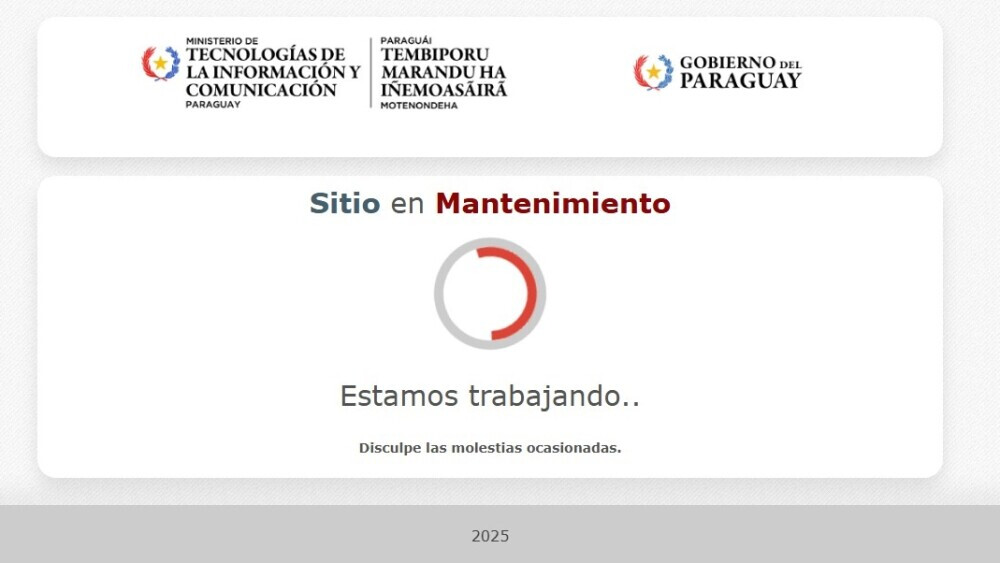
The official website of the Paraguayan government has once again fallen victim to a cyberattack. Last Thursday, the "Complaints" section of the National Traffic Safety Agency (ANTSV) website was hacked, resulting in a severe breach of sensitive personal information belonging to 7.4 million Paraguayan citizens. The leaked data includes a wide range of information such as names, surnames, occupations, genders, and dates of birth. It has been confirmed that hackers are currently selling this information for $300 (approximately 2,400,000 Guaraní).
Successive Government Agency Hacks Raise Concerns About Security System Collapse
This hacking incident occurred amidst a series of cyberattacks on Paraguayan government agencies, raising serious concerns about the overall national information security system. Previously, websites of major government institutions, including the Ministry of Health and the Central Bank, also suffered hacking attacks. Reports even suggest that the hacking of the Paraguayan government has caused a crisis for Brazilian security agencies, potentially escalating into an international issue.
Information analyst Luis Benítez stated that the leaked information appears similar to data held by the Paraguayan National Police and seems to have originated from a national ID-related database. He explained, "A post about a new ID database leak appeared on hacker forums. The ANTSV website was breached. The data has been leaked and is being sold." He added, "The complaints section website was particularly vulnerable. After speaking with one of the hackers, they were selling the data for $300."
Severity of Leaked Personal Information and Risk of Secondary Damage
Considering the volume and type of personal information leaked, Paraguayan citizens are now at a very high risk of exposure to various forms of secondary crimes, such as voice phishing, smishing, and identity theft. The fact that hackers are selling such a vast amount of personal information for a mere $300 indicates that the leaked information is either already widely disseminated or could be exploited for larger-scale cybercrimes. This data could be misused in various ways, including credit fraud, fraudulent loans, or for political purposes, necessitating extreme caution from the public.
Government's Lukewarm Response and Limitations of Cyber Security Strategy
Regarding this incident, Gustavo Villate, Minister of Information and Communication Technologies (Mitic), acknowledged that the website had been attacked and stated that the Cyber Incident Response Center (CERT) had begun handling the case. However, information analysts criticize the government's lukewarm response, asserting that existing cybersecurity strategies are insufficient to prevent such attacks.
Analyst Luis Benítez remarked, "This is a new leak. Coincidentally, on the day a new cybersecurity strategy was announced, this leak was made public, and I'm unsure of the intention behind it." He further expressed distrust in the government's cybersecurity policy, stating, "For the next 10 years, we will experience the same thing." His remarks align with criticisms that the government is only proposing superficial measures and neglecting substantial security enhancements.
Indeed, despite having been exposed to cyberattacks multiple times in the past, the Paraguayan government has been criticized for its inadequacy in fundamentally improving security systems or nurturing experts. This hack unequivocally exposes the vulnerabilities of the national information security system once again, demanding an overall re-evaluation and urgent implementation of practical countermeasures.
Deepening Public Distrust and Emergence of Government Accountability
The series of hacking incidents has further deepened the Paraguayan public's distrust in the government. The protection of personal information is directly linked to the fundamental rights of citizens, and the government must fulfill its duty to protect it. However, the repeated leakage incidents are fostering the perception that the government is failing to adequately fulfill this duty.
Experts warn that this incident goes beyond a simple hacking event and could pose a serious threat to national security. If the leaked data falls into the hands of foreign intelligence agencies or terrorist groups, a national security crisis could arise. Therefore, the Paraguayan government must take this incident as an opportunity to comprehensively review its cybersecurity policies, strengthen international cooperation, and actively invest in the training of specialized personnel.
Furthermore, it is crucial to establish practical support measures for affected citizens. Providing information to prevent secondary damage from leaked information, offering legal counseling, and establishing a rapid response system in case of damage are all necessary. The government cannot escape responsibility for this incident and must make extraordinary efforts to regain the public's trust.
Future Tasks: Strengthening Cybersecurity Laws and Expanding Investment
This hacking incident clearly demonstrates that one of the biggest challenges facing Paraguay in the era of digital transformation is cybersecurity. Moving forward, the Paraguayan government must strengthen cybersecurity-related laws, significantly increase relevant budgets, and enhance national cyber defense capabilities through cooperation with the private sector.
Specifically, focus should be placed on strengthening database security, advancing intrusion detection systems, and improving real-time response capabilities to cyber threats. Additionally, the government must continuously carry out educational campaigns to inform citizens about the importance of personal information protection and encourage safe online habits. Without such efforts, the Paraguayan government will continue to suffer from a cycle of hacking and lose the trust of its citizens.
[Copyright (c) Global Economic Times. All Rights Reserved.]






























